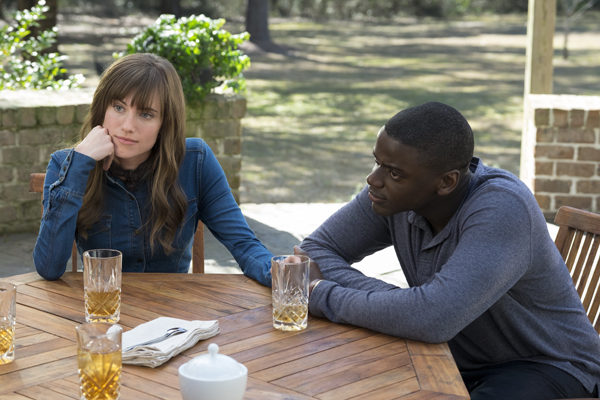![]() The best horror films have a way of tackling the anxieties of the day and using monsters as metaphors for those anxieties: lax morality and encroaching agnosticism in The Exorcist; the dawn of the nuclear world in Godzilla, Them, and other 1950’s monster films; and feminism and chauvinism in The Stepford Wives.
The best horror films have a way of tackling the anxieties of the day and using monsters as metaphors for those anxieties: lax morality and encroaching agnosticism in The Exorcist; the dawn of the nuclear world in Godzilla, Them, and other 1950’s monster films; and feminism and chauvinism in The Stepford Wives.
It’s the latter that writer/director Jordan Peele uses as a template for the creepy, funny, and pungent Get Out. Instead of the ladies being the focus of the eternal white male gaze, it’s black men, and Peele manages that transfer with élan.
His film begins with young and wholesome black photographer Chris Washington (Daniel Kaluuya) getting ready to meet the parents of the adorable, and white, Rose Armitage (Allison Williams). Rose hasn’t mentioned Chris’s race to her parents, but she isn’t worried. Her parents are very liberal. (In fact, her dad would have voted for Obama a third time if he could, so he says to Chris when they meet.) So, brimming with youthful optimism, the lovers head off full of hope to meet the parents.
And the parents do seem lovely. They are the picture of benevolent white privilege. Dean is relaxed and bearded with an easy manner and a tendency to overplay his “I get you” vibe with an extra slap on the back while calling Chris “My brother.” Missy, a therapist, wears exactly what you think a rich and well-meaning—and probably a formerly hippie—therapist would. Dean is even embarrassed that they have a black groundskeeper and maid, Georgina (Betty Gabriel), on the premises, but he claims they are just like family. So Chris lets it slide, which is a mistake, because there is something odd about the obsequious and unemotional demeanor of the employees and the benevolence of the Armitages that becomes more and more sinister.
What transpires next is to be discovered, but suffice to say, Peele (part of the comedy duo Key and Peele) walks the knife edge of satire and seriousness. There is a growing sense of dread as viewers realize just how much trouble Chris is in, and we are very much invested in his fate as the narrative is seen through his eyes. In a perfect world, his race would make no difference. Of course, in our world, it does, and Peele takes pains to make him appeal to white filmgoers as well as black viewers, because he is telling a horror tale to his black audience and a morality tale to his white viewers.
This film has already made a mint and produced a cottage industry of think pieces as it tackles race and discrimination and white privilege head-on, but what gets lost in the shuffle is just how good Peele’s script and direction are and how genuinely odd the film is. Every moment of the script is pinpoint precise in plot, character, and execution. What does it say about Rose when she hits a deer while driving and then, after the vehicle has pulled over, she casually leans on the car while Chris goes into the woods to investigate? Why does Georgina keep fussing with her hair? Who keeps unplugging Chris’s dang IPhone so it doesn’t charge? The answer to that is not the obvious one. It is, in fact, even more particular and sinister.
The tone is so hard to nail down, yet if feels completely natural to the circumstances and the movie’s theme. It’s also very funny, but the laughs it provides are sour. Peele is giving us some serious food for thought while flipping from mordant comedy to trenchant social insight with a lightness and deftness that is rare in any genre, much less horror.
He has also done his homework. He is clearly a fan of 1970’s social-horror films, such as Dawn of the Dead and the aforementioned The Stepford Wives, but he has a clear fondness for the second tier movies of that genre, such as Don’t Be Afraid of the Dark, Bad Ronald or the whacked-out Donald Cammell film Demon Seed, all which take a relatively high-concept idea and run with it to gloriously corny effect. Without giving anything away, the “science” in Get Out is willfully absurd and the practicing of this science is gleefully ridiculous. There are other flyby homages Peele throws to these films, such as the gloriously ’70s basement with its wood paneling, the old-school TV cabinet and La-Z-Boy easy chair, and the flute that flutters over the orchestral soundtrack, all of which ground the movie firmly in a ’70s sensibility.
None of this dilutes the power of the piece. Rather, it reinforces it. It reminds us that two steps forward in race relations don’t take into account the hundreds of steps we still have to go, so every step backward is a chasm we have to recross. The film parodies white perceptions of black stereotypes while acknowledging the ridiculous of the idea that every white person is a secret and active racist by making sure that every white person in the movie is a secret and active racist. It’s a joke and a statement. Nothing in here is, or should be, taken at face value. But make no mistake: everything in Get Out should be taken seriously. Deadly seriously.







Leave A Comment